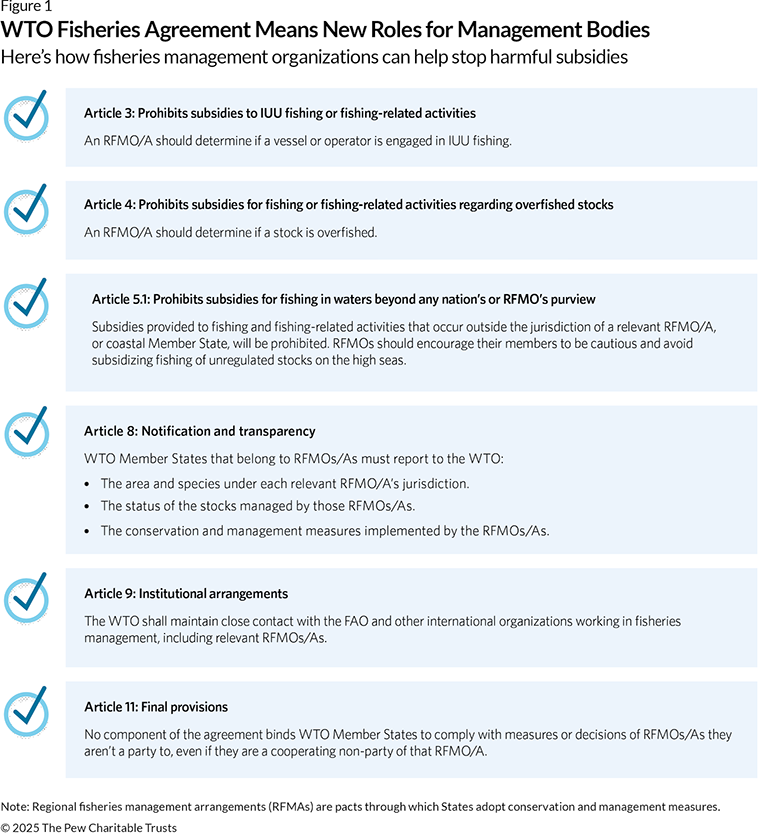How Regional Fisheries Managers Can Help End Harmful Subsidies
Success of World Trade Organization deal hinges on transparency and compliance

Overview
Overfishing and illegal, unreported and unregulated (IUU) fishing not only strain fish populations around the world, but also threaten the food security and economic livelihoods of hundreds of millions of people.
More than one-third of fish stocks worldwide are exploited beyond sustainable levels, according to the Food and Agriculture Organization (FAO) of the United Nations. Worse, a lot of the fishing pressure causing this would be unprofitable if it weren’t subsidized by governments that pay fleets to go farther from shore in pursuit of a dwindling number of fish.
In fact, of the $35 billion in subsidies that governments provide each year to their fishing industries, $22 billion are harmful—that is, they are granted primarily to industrial fleets and accelerate overfishing, artificially lowering the costs of fuel, vessel construction and repair, and other expenses.
These subsidies increase fishing capacity, which means that large industrial vessels are better able to catch more fish than is sustainable and to continue fishing when it wouldn’t be profitable without subsidies. This in turn hurts small local fishers worldwide because it depletes the fish stocks closer to home that those fishers typically rely on, forcing many of them to travel farther from shore and stay at sea longer to catch enough fish to feed their communities.
It is vital that governments around the world significantly reduce overfishing and IUU fishing to sustain targeted fish populations, help to protect the balance of the ocean’s ecosystem and ensure a viable future for coastal fishing communities.
Fortunately, there has been some progress on this front. In 2022, Member States of the World Trade Organization (WTO) adopted the Agreement on Fisheries Subsidies, which established a global, legally binding framework that limits subsidies for vessels and operators engaged in IUU fishing, or fishing of overfished or unassessed stocks, or fishing of unregulated stocks in waters beyond any nation’s jurisdiction.
Regional fisheries management organizations (RFMOs) have many tools available to combat IUU fishing and improve ocean governance. Strong and effective RFMO direction helps countries provide oversight and governance for their fishing fleets to ensure that they meet international mandates – including those in the WTO agreement.
What does the agreement do?
The Agreement on Fisheries Subsidies establishes global rules that go beyond previously agreed regional or bilateral deals. The WTO agreement applies to subsidies for wild-caught marine life and “fishing-related activities” at sea, which can include transshipment (the at-sea transfer of catch from one ship to another) and the provisioning of fuel and personnel. It does not cover all subsidies, such as those for aquaculture and inland fisheries.
As part of the agreement, WTO Member States must consider the current state of a fish stock before granting subsidies. And if they, or an RFMO, determine that a stock is overfished, Member States may not continue subsidizing it unless they confirm that they have measures in place to rebuild that stock.
Governments also agreed to weigh carefully the consequences of providing subsidies to “reflagged” vessels – those that change their registration from the subsidizing country to another, which nefarious actors often do to bypass fisheries laws – as well as providing subsidies to vessels fishing for unassessed stocks (those whose conservation status is unknown).
The agreement also includes measures that will enhance transparency and accountability, enabling the WTO to more effectively track how countries are implementing and complying with the fisheries subsidies regulations.
Why are RFMOs included in the agreement?
RFMOs are responsible for the conservation and management of the world’s most valuable commercial fish stocks, such as tuna. These international bodies are composed of member governments that share a practical or financial interest in managing and conserving fish stocks – for example, coastal countries that fish in or near the RFMO’s area and countries that import that fishery’s products. RFMOs are critical to helping operationalize the Agreement on Fisheries Subsidies (see Figure 1). RFMOs can require monitoring, control and surveillance of fishing and fishing vessels in their waters and thus could help governments provide the WTO with detailed information on precisely what fishing is being subsidized in those areas. This could include information on the status of the fish stock, any conservation or management measures in place, and catch data.
Nations with large fishing fleets that span the globe also belong to many RFMOs; these governments include the few that provide most of the world’s harmful fisheries subsidies – namely China, the European Union and Japan.
What role should RFMOs play in implementing the agreement?
The agreement establishes a careful link among the WTO, its Member States and RFMOs. Specifically, the agreement requires these stakeholders to coordinate so that WTO Member States can address an RFMO’s determinations. RFMOs should be aware of the following provisions and should work to help enforce them:
- Any time an RFMO determines IUU fishing is happening, the agreement requires WTO Member States to stop paying subsidies to those vessels or operators.
- The agreement prohibits subsidies that go towards fishing of stocks that RFMOs consider overfished, unless the RFMO has implemented measures to help that stock recover.
- The agreement prohibits subsidies for fishing-related activities on stocks outside the jurisdiction of WTO Member States or relevant RFMOs.
- WTO Member States must carefully consider the impacts before subsidizing fishing-related activities targeting stocks that RFMOs have not yet assessed for overfishing. RFMOs should encourage their members to avoid subsidizing fishing of unassessed stocks.
Conclusion
The success of the WTO agreement relies on RFMOs and other international organizations sharing information to enable transparency and compliance. It is critical that RFMOs are invested in improving ocean health and helping fish stocks recover, which they can do by ensuring compliance with the WTO agreement.











